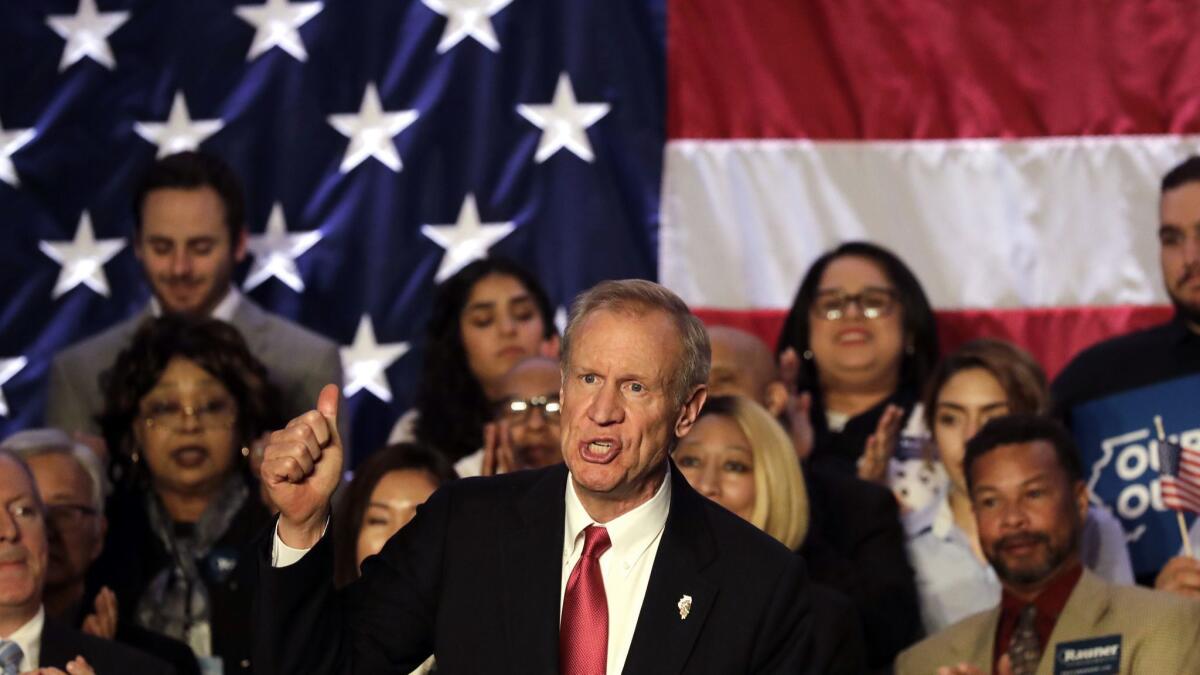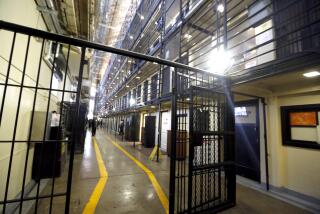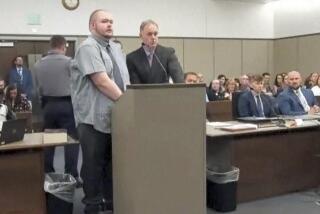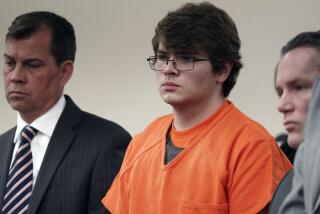Illinois governor proposes reinstating death penalty in cases of mass killings, police slayings

Illinois Gov. Bruce Rauner on Monday proposed reinstating the death penalty in Illinois for mass killers and people who slay law enforcement officers.
The death penalty provision, part of Rauner’s rewrite of a gun control bill, would create a new category of homicide called “death penalty murder,” which could apply to adults who kill police officers or more than one person. Guilt must be determined “beyond all doubt,” rather than the standard “reasonable doubt” requirement, according to the governor’s office. Rauner said at a Chicago news conference Monday that people in those cases “deserve to have their life taken.”
The measure the Republican governor rewrote originally was designed to create a 72-hour “cooling off” period to buy an assault weapon for those who may have intent to cause harm, and to allow additional time for sellers to complete a background check. Under current law, the waiting period to purchase assault weapons including AR-15s is 24 hours. It’s 72 hours to buy a handgun.
Rauner said he also wants the bill to include a “complete ban” on the sale and possession of bump stocks and trigger cranks, devices designed to make guns fire more rapidly. He wants courts to have the ability to remove guns from people who are deemed dangerous and for judges and prosecutors to be required to explain decisions on plea agreements that result in the release of habitual gun offenders. And he wants funding to hire mental health workers for schools.
The governor’s decision on the legislation means that the Democratic-controlled General Assembly will have to either accept his changes or override them in order for the underlying bill to become law.
Rauner said the 72-hour rule should apply to all guns.
“If someone is perhaps on the verge of committing suicide, if someone is potentially a dangerous person and they have violent acts in mind, that extra two days could make the difference between life and death,” Rauner said Monday at the news conference.
But while expressing support for the underlying purpose of the bill, Rauner used the measure as a vehicle for putting forward the additional proposals, which he said were the product of a public safety task force he convened earlier this year. That means that the 72-hour waiting period can’t be enacted unless lawmakers consider his other proposals or pass a new bill. Had the governor signed the bill Monday, or had he done nothing, the 72-hour waiting period would have become law immediately.
Democratic state Rep. Jonathan Carroll of Northbrook said he expected the death penalty provision and changes on plea bargains to complicate things politically.
“He hijacked my bill and put politics ahead of policy,” Carroll said. He said he had not been consulted about the governor’s proposed changes.
“I think that it was very telling that there was not one Democrat there,” Carroll said of the news conference, which was held at an Illinois State Police facility in Chicago. “It would have been nice if, as the original sponsor, if I would have been invited to have conversations about this bill or even to the press conference today to talk about this bill.”
Rauner’s rewrite of the measure allows him to tout some tough-on-crime ideas promoted by conservatives as he is trying to unify the Republican Party ahead of the November election, while also showing suburban moderates — another key constituency — that he is taking gun violence seriously.
“It is a comprehensive package, it is a thoughtful package, it is good policy,” Rauner said. “Each piece is critically important.”
The death penalty provision in particular could become part of election-year campaigning. Former Gov. George Ryan put a moratorium on death penalty sentences in 2000, and former Gov. Pat Quinn signed legislation to outlaw the practice in 2011.
Of the provision that would allow confiscation of guns from people who are deemed dangerous, Rauner said such a removal would be allowed for a period of 14 days “and then they go back to the individual if there’s no real proof, real evidence” justifying the confiscation.
“This can’t just be a random, unjustified accusation or statement by someone. This has to go through a process, it needs to be adjudicated,” Rauner said. “We want to protect the rights of individuals, their constitutional protection. … We also have a duty as a community, as a society, to do what we can when there’s clear evidence that someone” is dangerous.
The legislation was one of several gun control bills that surfaced after a series of high-profile shootings, including the February massacre at a high school in Parkland, Fla. The violence sparked demonstrations at schools across the nation as students called for tougher regulations amid pushback from gun owners who argue their 2nd Amendment rights are at risk.
In March, Rauner vetoed a separate measure that would have created a new state licensing system for gun shops. He argued that it was duplicative because gun retailers are already licensed by the federal Bureau of Alcohol, Tobacco, Firearms and Explosives. He also maintained it would force small businesses to close without making communities safer.
Supporters contend that federal rules do not go far enough. As Rauner was talking with reporters Monday, Democratic state Sen. Don Harmon announced plans to unveil a revamped proposal on gun licensing on Tuesday.
Supporters of that effort hope Rauner may be less inclined to reject the proposal a second time as he seeks to appeal to a wider audience ahead of a November matchup against Democratic challenger J.B. Pritzker. His veto of the licensing bill came just days before the March 20 primary election, in which he faced a challenge from conservative Rep. Jeanne Ives. Ives opposed the bill.
More to Read
Start your day right
Sign up for Essential California for news, features and recommendations from the L.A. Times and beyond in your inbox six days a week.
You may occasionally receive promotional content from the Los Angeles Times.






